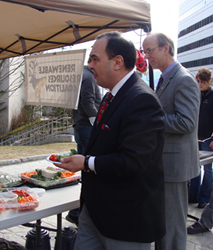Twenty young activists from around the state gathered in Juneau this week for the 12th annual Civics and Conservation Summit, sponsored by Alaska Youth for Environmental Action.
The week-long conference teaches teens about the legislative process and how to talk to lawmakers about their issues.
KTOO’s Casey Kelly has more.

Fresh king salmon on the grill is one way to get legislators to your event in Juneau. Not that the Alaska Youth for Environmental Action needed much help at a reception across the street from the capitol building on Thursday. The young conservationists – ages 13 to 18 – spent most of the week meeting with lawmakers to promote AYEA’s legislative agenda.
Emily Brease is an 18-year-old senior at Tri-Valley School in Healy. This is her second year attending the Civics and Conservation Summit.
“Last year was just life changing,” says Brease. “You just don’t realize how much of a difference you can really make, how much you can really be involved in the process, and how much it means to the representatives when you come and you sit down and you talk about the issues you care about .”
Early in the week, the teens split into groups and choose the bills they want to urge lawmakers to support. Brease’s group worked on legislation that would ban certain chemicals from being used as fire retardants in household products sold in Alaska. The chemicals are known as PBDEs.
“Polybrominated diphenylethers, so it’s a mouthful,” Brease says. “It was chosen, because I think a lot of people don’t know about it and it’s these toxic flame retardants are used in everything – your electronics, your furniture, your upholstery – and they are shown to have medical effects. Thyroid, reproductive, and possibly carcinogenic.”
Fourteen-year-old Barrow High School freshman Jonathan Nelson worked with his group to promote a bill that would require legislative approval for large scale sulfide mining activity in the Bristol Bay watershed. It’s an attempt to slow down or stall the controversial Pebble Mine project. Bristol Bay is a long way from Barrow, but Nelson says the mine’s affects could be felt around the state.
“A person from, like, New York hears that a fish in Alaska got mercury in it. He’s not going to say it’s only Bristol Bay – he’s going to say Alaska,” Nelson says. “And, that’s going to basically tarnish the whole entire salmon name in Alaska.”
For Nelson, attending his first Civics and Conservation Summit included an important lesson about the realities of the legislative process.
“The only sponsor for my bill – SB 152 – is Hollis French, Senator French,” he says. “We went and talked to him. He knew that the bill wasn’t going to pass.”
Senator French says that’s just the way it goes sometimes in Juneau.
“You know, we may have had a frank conversation about it, and it’s probably not going to pass,” French says with a laugh. “But it’s an important conversation starter. It’s important for them to know that they have people in the building who are willing to advance ideas that may not always get there. But you have to have the dialog, you have to have the debate, and so I’m proud to be a part of that.”
French, along with Senators Bill Wielechowski and Gary Stevens were honored as AYEA’s Legislators of the Year on Thursday.
Wielechowski, who sponsored the bill banning PBDEs, says he was impressed by the students’ knowledge of the issue.
“They knew what they were talking about. They had done a lot of research,” Wielechowski says. “They asked me some very pointed questions about it, which showed they really had been studying it.”
Wielechowski’s bill is currently in the Senate Rules Committee, usually the last stop before legislation goes to the full Senate for a vote.
Senator Stevens was honored for working to re-establish the Alaska Coastal Management Program. That legislation is currently working its way through the House.
Other bills supported by AYEA this session include Senate Bill 3, which would provide state matching funds for the federal school meals program, and House Bill 100, which would ban genetically modified fish in Alaska.
